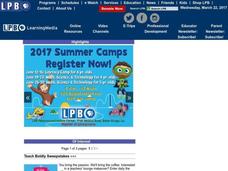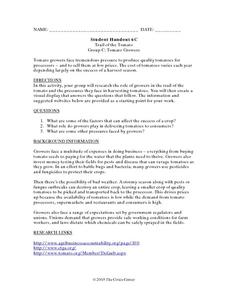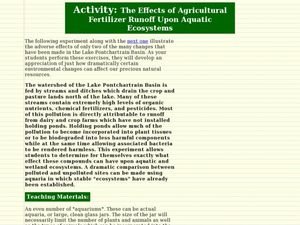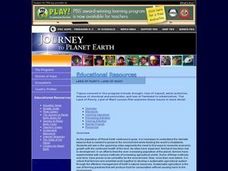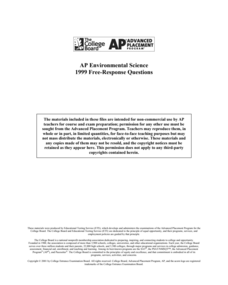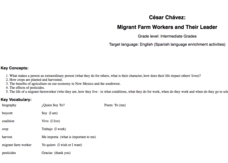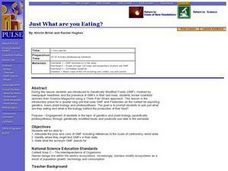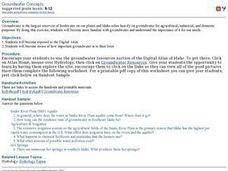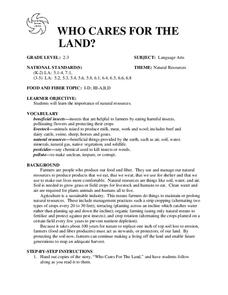California Academy of Science
Pollution in Our Watershed
The concept of a how pesticides and other chemicals pass through a watershed can be difficult for younger learners to grasp without a concrete example. In the activity here, some blank paper, markers, and a spray bottle are all you need...
Curated OER
When Is a Pest an Insect?
Students view the importance of insects as pollinators. They are now posed with the problem--those insects are nice--but insects are pests right? Students explore their description of pests and pesticides.
Curated OER
Cultivating Oklahoma's Future
In this Oklahoma agriculture lesson, 8th graders read and discuss information and vocabulary about new developments in agriculture. Students write essays on the future of agriculture in Oklahoma.
Curated OER
The Economics of Horticultural Production
Students examine how government programs and sustainable practices can affect farm profitability. In this agriculture lesson students complete several activities that include the prices of food and designing their own ecolabel.
Curated OER
What's Organic?
Students define and discuss terms organic and synthetic, read article pertaining to organic agricultural practices in Oklahoma, complete worksheet, grow plants using both commercial and organic fertilizer, compare growth rates, and chart...
Curated OER
How Does Your Garden Grow?
Young scholars explore how to use natural fertilizers and pesticides by growing an organic vegetable garden by growing plants and using a variety of soil amendments.
Curated OER
Trail of the Tomato Growers
Economic pressures to produce and harvest in order to meet consumer needs is a very real issue. In small groups, the class uses three guiding questions to research the pressures on tomato growers to harvest at a level that meets the...
Curated OER
The Effects of Agricultural Fertilizer Runoff Upon Aquatic Ecosystems
Students measure the toxic levels of runoff and discuss the effects it would have on the aquatic system. In this runoff lesson plan, students answer questions to how runoff would affect the animals in an aquatic system.
Curated OER
Land of Plenty, Land of Want
Students view a video about the state of the environment. They discover the topic of sustainable agriculture. They identify problems and how to solve them.
Balanced Assessment
County Concerns
Apply area concepts to help farmers and settle county disputes. Scholars use a given diagram and information about an insecticide spraying campaign to determine the monetary benefit to farmers. They then decide which of two counties has...
College Board
1999 AP® Environmental Science Free-Response Questions
Pollution is a real concern in most areas of Earth. A four-question AP® assessment has learners analyze data related to water pollution and air pollution as well as consider the pros and cons of recycling. Each question has several...
Curated OER
From the Farm to Your Table: Where Does Our Food Come From?
Students discover where the food they eat comes from. Using maps, they identify the agricultural areas of the United States and the products that are grown in each area. Using the internet, they research how food gets to America from...
University of New Mexico
César Chávez: Migrant Farm Workers and Their Leader
During the first week of instruction, middle schoolers research biographies on Cesar Chavez and make a pictorial collage of his life. For the second and third week, they maintain a seven-day diary of a farmworker and write a poem. For...
Curated OER
Just What are you Eating?
Learners identify and articulate pros and cons of genetically modified foods (GMF) including references to scale of controversy worldwide. Students then identify where they might find GMFs in their diets, read different opinion pieces on...
Curated OER
Groundwater Concepts
Students use a digital atlas and other electronic resources to explore freshwater reservoirs in Idaho. They discover the importance of groundwater and discuss the agricultural, industrial and domestic uses of underground reservoirs....
Curated OER
The Risks of Everyday Living
Students compare their perceptions of risk to the perceptions of scientists and risk professionals. in small groups, they evaluate risks on a scale of 1 to 10 for the average American on a yearly basis.
What happened to the frogs?
Students will select ten rubber frogs and determine their pollutant source based on their malformations. Students will write a brief essay on their findings. Students will be engaged in the lesson the entire time!
Global Oneness Project
Rethinking the Fabrics We Wear
What are fibersheds and what what do they have to do with environmental protections? A photo essay and audio recordings about Mimi Luebbermann, and her sheep, cause consumers to reflect on how their clothing choices can support local...
Curated OER
Manduca
Students investigate the basic survival needs of both hornworms and humans. They compare and contrast the them by making a class list.
Curated OER
Rock River Watershed
Students discover what a watershed is and which one they live in. Using the internet, they research why watersheds are important to an ecosystem and how to keep them from getting polluted. They use a map to locate various items within a...
Curated OER
What's Organic?
Young scholars discuss background information presented by the teacher and read dictionary definitions for the words "organic" and "synthetic." In this gardengin lesson, students complete a worksheet on the material. Young scholars grow...
Curated OER
Pollinator Habitats
Learners read and discuss background information included with this lesson. They brainstorm the best sources for developing a list of native or migratory pollinators. Students work in groups to design habitats based on information...
Curated OER
WHO CARES FOR THE LAND?
Students explore the importance of natural resources. They are given copies of the story, "Who Cares For The Land," and students follow
along as the teacher reads it. Students identify the key points in the story. (Soil, water and air...
Curated OER
Track the Path of Coffee From Farm to Store Shelf
Students investigate the cultivation and marketing of coffee. In this global studies lesson, students consider the connections of the 21st century world as they explore how coffee makes it from farms to their homes. Students consider the...







